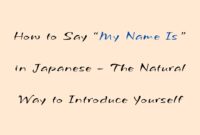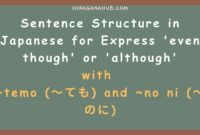How to Express Desire in Japanese: ~がほしい, ~たい,
~たがっている
Today, we’ll learn how to express desires in Japanese using
~がほしい, ~たい, and ~たがっている.

1. Expressing Desire for Something (~がほしい)
Use “noun + が + ほしい” to express wanting an
object.
Example Sentences:
-
新しい時計がほしいです
(あたらしいとけいがほしいです – atarashii tokei ga hoshii
desu)
: I want a new watch. -
誕生日にどんなプレゼントがほしいですか
(たんじょうびにどんなプレゼントがほしいですか – tanjoubi ni donna
purezento ga hoshii desu ka)
: What kind of present do you want for your birthday? -
大きいテレビがほしいんです
(おおきいテレビがほしいんです – ookii terebi ga hoshii n
desu)
: I want a big TV.
To emphasize your desire, add の or
ん before です.
Additional Examples:
-
もっと自由な時間がほしいんです
(もっとじゆうなじかんがほしいんです – motto jiyuu na jikan ga
hoshii n desu)
: I want more free time. -
海外旅行に行くためのお金がほしいのです
(かいがいりょこうにいくためのおかねがほしいのです – kaigai ryokou
ni iku tame no okane ga hoshii no desu)
: I want money to travel abroad.
2. Expressing Desire to Do Something (~たい)
To express the desire to do something, use
“verb in -masu stem (remove ます) + たい”.
Verb Conjugation Examples:
-
読む (よむ – yomu) →
読みたい (よみたい – yomitai) : want to read -
遊ぶ (あそぶ – asobu) →
遊びたい (あそびたい – asobitai) : want to play -
泳ぐ (およぐ – oyogu) →
泳ぎたい (およぎたい – oyogitai) : want to swim -
作る (つくる – tsukuru) →
作りたい (つくりたい – tsukuritai) : want to make -
話す (はなす – hanasu) →
話したい (はなしたい – hanashitai) : want to talk
To sound more polite, add です at the end.
Example Sentences:
-
アメリカに行きたいです
(アメリカにいきたいです – amerika ni ikitai desu)
: I want to go to America. -
新しい料理を作りたいです
(あたらしいりょうりをつくりたいです – atarashii ryouri o
tsukuritai desu)
: I want to cook a new dish. -
海で泳ぎたいです
(うみでおよぎたいです – umi de oyogitai desu)
: I want to swim in the ocean.
3. Negative and Past Forms of ~たい
The ~たい form is conjugated like an
-i adjective.
Negative Form (~たくない)
-
今日は何もしたくないです
(きょうはなにもしたくないです – kyou wa nanimo shitakunai
desu)
: I don’t want to do anything today. -
寒いから外に出たくないです
(さむいからそとにでたくないです – samui kara soto ni detakunai
desu)
: It’s cold, so I don’t want to go outside.
Past Form (~たかった)
-
昨日新しい本を読みたかったです
(きのうあたらしいほんをよみたかったです – kinou atarashii hon o
yomitakatta desu)
: I wanted to read a new book yesterday. -
子供の頃、宇宙に行きたかったです
(こどものころ、うちゅうにいきたかったです – kodomo no koro, uchuu
ni ikitakatta desu)
: When I was a child, I wanted to go to space.
4. Expressing Someone Else’s Desire (~たがる /
~たがっている)
The ~たい form is only used for yourself or when
asking others directly. To express someone else’s desire, use
“~たがる” or “~たがっている”.
Example Sentences:
-
彼は新しい車を買いたがっています
(かれはあたらしいくるまをかいたがっています – kare wa atarashii
kuruma o kaitagatte imasu)
: He wants to buy a new car. -
弟は外で遊びたがっています
(おとうとはそとであそびたがっています – otouto wa soto de
asobitagatte imasu)
: My little brother wants to play outside. -
その猫は窓の外を見たがっている
(そのねこはまどのそとをみたがっている – sono neko wa mado no soto
o mitagatte iru)
: That cat wants to look outside the window.
5. Summary
- ~がほしい → Used to express desire for an object.
-
~たい → Used to express a willingness to do
something. -
~たがる / ~たがっている → Used to express someone
else’s desire.
With these patterns, you can naturally express your wants and needs in
Japanese!
6. Vocabulary List
| Kanji | Hiragana | Romaji | Meaning |
|---|---|---|---|
| 新しい | あたらしい | atarashii | new |
| 時計 | とけい | tokei | watch |
| 料理 | りょうり | ryouri | cooking/dish |
| 海 | うみ | umi | sea/ocean |
| 本 | ほん | hon | book |
| 宇宙 | うちゅう | uchuu | space |
| 外 | そと | soto | outside |
| 遊ぶ | あそぶ | asobu | to play |
| 泳ぐ | およぐ | oyogu | to swim |
| 作る | つくる | tsukuru | to make |
| 話す | はなす | hanasu | to talk |
| 窓 | まど | mado | window |
| 車 | くるま | kuruma | car |
| 自由 | じゆう | jiyuu | freedom |
I hope this lesson helps! Happy learning! 🚀


